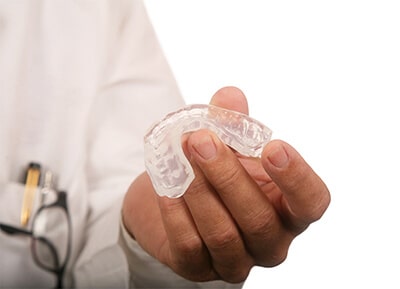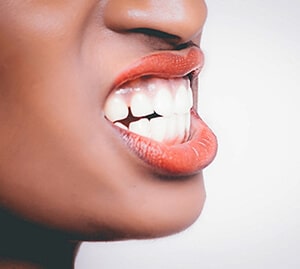 You have probably seen athletes use mouth guards to protect their teeth from damage while playing sports, but you might not know that there are lots of ways that even non-athletes can benefit from using a mouth guard, especially while you are sleep.
You have probably seen athletes use mouth guards to protect their teeth from damage while playing sports, but you might not know that there are lots of ways that even non-athletes can benefit from using a mouth guard, especially while you are sleep.
Many patients complain that they have headaches, shoulder and neck pain, and facial pain when they wake up. Many of these patients are surprised to learn that these symptoms can be due to bruxism. Bruxism is a common condition that causes patients to grind their teeth and clench their jaw. Bruxism sufferers most often grind their teeth when they sleep, but many people clench their jaw throughout the day. Symptoms can cause tooth damage, pain, and insomnia. Stress plays a primary role, but several lifestyle factors can also contribute the prevalence of bruxism. A night guard protects your teeth and can reduce the tendency to clench and grind your teeth while you are asleep.
Night guards can also be used to manage jaw pain and lockjaw, or in the treatment of TMJ to relieve the effects of popping and clicking of the jaw. Patients often experience pain and discomfort that makes it hard for them to get enough sleep, and the use of a night guard can reduce and possibly eliminate this type of insomnia. Night guards can address a wide variety of problems including:
Stop Tooth Damage
Constant grinding and clenching of your teeth can contribute to chipped and broken teeth or may damage fillings. Stress cracks can appear, and grinding your teeth wears away your enamel, making your teeth more prone to cavities and sensitive to thing you drink or eat. A night guard prevents teeth from grinding against one another and allows you to avoid expensive restoration procedures and tooth loss.
Alleviate Facial Pain and Headaches
Toothaches, headaches, and facial pain are common symptoms of bruxism (grinding and clenching) and temporomandibular disorders (TMD). Sufferers often complain of muscle fatigue in the face, ear aches, a sore jaw, neck pain, and even spasms in the shoulders, neck and facial muscles. A night guard can help to relieve or even eliminate the recurrence of these symptoms. A personalized mouth guard can also help to alleviate TMJ-related jaw pain.
 Reduce Stress and Tension
Reduce Stress and Tension
Custom night guards can reduce the stress in your jaw joints and muscles. When this stress is alleviated and the pain associated with it is relieved, you can talk, laugh, and eat without the constant pain and discomfort, thus reducing stress both day and night. This reduction of stress can minimize or even eliminate grinding and clenching, reduce tooth sensitivity, and allow you to potentially avoid symptoms altogether.
Sleep Better
Reduction or elimination of the symptoms of bruxism or other jaw problems allows you to experience less pain and improve your ability to get quality, restful sleep. A night guard can be custom fitted to modify the position of your jaw and promote muscle relaxation The relief of this constant jaw pain encourages you to rest and to enjoy healthier sleep patterns.
Stop the Snoring
Bruxism and jaw problems can contribute breathing problems that contribute to snoring while you sleep. Many patients snore as a symptom of clenching and grinding their teeth, and a night guard can position the mouth so that you are able to breathe better and avoid snoring. You should consult with your dentist or doctor if you are afraid that you tend to stop breathing at night. This could be the sign of a more serious sleep disorder.
Two visits to your dentist are required to be fitted for your mouth guard: at the first, your dentist will make a mold of your mouth to create the guard. during the second visit your will pick up your guard and check that it fits properly. Your dentist will instruct you about use and care for your guard when you pick it up.
Talk to your dentist today about how a custom night guard can protect your teeth and improve your life!



